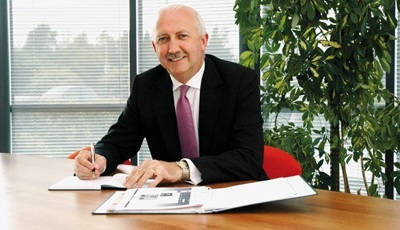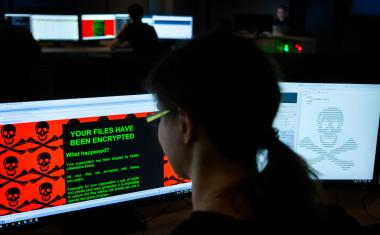The Main Functions of the BSIA and One of Its Member Companies, TDSi
Ground-breaking and innovative companies find it difficult to get legislation changed or to establish standards of practice by themselves. Here, a trade association will represent ...


Ground-breaking and innovative companies find it difficult to get legislation changed or to establish standards of practice by themselves. Here, a trade association will represent their cause and that of like-minded companies. After Intersec in Dubai, GIT-SECURITY.com spoke with James Kelly, Chief Executive of the British Security Industry Association (BSIA) and with John Davies who is Chairman of the BSIA Export Council and of TDSi.
Mr. Kelly, is it possible to characterize a specific role of British companies in the international security market - are there, in your experience, certain skills or qualities that are being connected with British products?
James Kelly: Quality, I think, is the overarching theme here, particularly for overseas customers choosing to purchase their security products and services from a BSIA member company. The BSIA‘s strict membership criteria means that they can have confidence that their security is in safe hands, despite being located in a different country. The BSIA requires its members to be independently inspected to the ISO 9001 quality standard, which also includes confirmation of compliance to British and European standards where applicable.
Where are the particular strengths of British security businesses compared with those of other countries?
James Kelly: Best practice is highly important to BSIA member companies, which can provide reassurance to overseas buyers. BSIA members are at the forefront of standards development in both the UK and Europe, and the Association‘s own codes of practice often go forward to be developed into British or European standards. The UK Trade and Investment (UKTI)‘s Defense and Security Organization (UKTI DSO) worked with various security industry bodies, including the BSIA, to produce a report on the capabilities and strengths of the UK security industry. This report found that UK companies receive considerable international recognition for their ability to provide reputable, trustworthy services and reliable products. Among the results of this report, it was noted that the UK provides security support to NATO programs including maritime protection and defense against mortar attacks, and is also a world leader in chemical, biological, radiological and nuclear (CBRN) defensive equipment. Not only that, UK security companies are also recognized for their skills in providing security for world sporting events, including the Beijing 2008 Olympic Games. They also have extensive experience in border patrol, utilizing the latest biometric and forensic equipment at airports and ports, as well as helping secure cyber activity worldwide through specialist systems developed in the UK.
Could you give us an idea of the size and relevance of the BSIA? How many members are there and what are the important topics on your agenda as an association?
James Kelly: The BSIA is the trade association representing approximately 500 members operating in all aspects of the UK‘s private security industry, including electronic sectors such as CCTV, Access Control and alarm manufacturers, as well as manned-guarding sectors, including security guarding, consultancies and close protection. The BSIA is primarily a lobbying organization and is extremely active in liaising with Government to ensure that legislation reflects industry and customer needs. The Association lobbied for regulation of the security industry for over 15 years, culminating in the introduction of the Private Security Industry Act 2001 and the launch of the Security Industry Authority. More recently, the BSIA has been involved in the development of a new era of regulation and licensing for the UK security industry, with the Association at the heart of the Security Regulation Alliance, a single-issue body established to work alongside Government and the SIA to ensure that the future regulatory landscape is fit for purpose and beneficial to our members.
Mr. Davies, you are chairman of the Export Council of the British Security Industry Association and have done surveys on security customer's demands. Could you sum up the findings for us?
John Davies: With the world market for fire protection and security valued at around £176.8bn, raising awareness in overseas markets of the quality of UK products and services is a key function of the BSIA, and in particular of its Export Council. This is a forum for BSIA member companies who are focused on extending their local business to overseas markets and also acts as an invaluable port of call if overseas contacts are interested in developing a relationship with a UK company, either as a customer or distributor. Recently the Export Council carried out some research to coincide with the recent Intersec 2012 event in Dubai, which underlined the heightened demand in the Middle East marketplace for the latest security systems from UK businesses, despite significantly tougher global trading conditions. Nearly two-thirds of the BSIA‘s Export Council‘s member companies (62.5 %), who responded to the survey and were active in this pivotal region, reported that they had witnessed a notable increase in their business revenues from the Middle East over the past 12 months. By contrast just under a third (31.3 %) of the companies saw business levels remaining static and only a small minority (6.3 %) reported sales in the region had fallen.
In which branch of security are these firms active and where do they see their customers' main interest?
John Davies: In terms of the business areas covered by the companies surveyed, 75 % were electronic security manufacturers, 12.5 % were involved in cash and property marking, with the remainder split equally between security distributors and installers. When they were questioned about the approach to security technology that they believe has had the greatest impact in the Middle East over the past 12 months, the clear leader was hybrid solutions, cited by 61.5 % of those surveyed. These are able to combine legacy analog infrastructure with the latest digital, networked, security technology. Alongside this, with the HD (High Definition) revolution well established for consumer electronics, BSIA‘s Export Council members are starting to see mega-pixel technology making its mark on CCTV in the Middle East, at 30.8 % being ranked second in this element of the survey. Another approach, Intelligent VCA (Video Content Analysis) whose potential is now finally being realized, came in third at 7.7 %. Significantly, the research investigated the leading factors that Export Council members were seeing as the drivers for customer buying decisions in the Middle East. It was discovered, for instance, that although initial purchase price ranked as the most important by 57.1 % of the respondents, technological innovation was cited as the leading element by nearly 29 % of those surveyed. In addition, it was encouraging to find that compliance with industry standards - which is a key requirement for BSIA membership - was the main decision-making factor that 14.3 % of companies questioned were finding in dealing with their Middle East customers. Above and beyond these, other subsidiary factors mentioned included confidence in the supplier and if it was a prestige brand. The survey also sought to discover which vertical markets were leading the way in taking up the solutions offered by BSIA Export Council member companies. It was reported that the top market sector was government at 64.3 %, followed in joint second place by hotel/leisure and retail - both with 14.3 % - and finally transport at 7.1 %.
Was your Company's presence in Dubai successful? In what way?
John Davies: Intersec 2012 was successful for us. We experienced a 35 % growth in visitors to our stand and noticed that the geographic spread of visitors was wider this year. Of particular note was the number of visitors from both East and West Africa.
What impressions did you personally bring back from Dubai and the Middle East in general?
John Davies: TDSi has been exhibiting at Intersec now for 8 years. Over that time the show has grown significantly and is now the pre-eminent regional security exhibition that attracts visitors from across the Middle East. The Middle East in particular is an important and growing region for the sale of our products. TDSi sales to the Middle East represent 15 % of our total and these sales are showing double digit growth year on year. We've noticed that customers in the region are also becoming an important source for new product ideas and innovation.
The Company is 30 years old this year. What has changed since the very beginning of TDSi‘s career in the security market?
John Davies: TDSi started life in the Time and Attendance market (hence Time and Data Systems International) and quickly moved into the electronic access control market when we invented the Infrared card reading technology. The development of 1, 2 and 4 door controllers soon followed and relationships with companies such as Chubb opened up overseas markets. There have been many changes in the last 30 years, mainly driven by the development of new card reading technologies like mag stripe, Weigand prox and Mifare. And over the last decade there has been significant growth in and the acceptance of biometric reading technologies.
Is there anything particular that's moved the market?
John Davies: Over the last decade there has been a noticeable movement on the integration side of things which today sees access control at the hub of integrated physical and network security and surveillance systems. The fast pace of integration is also driving the move away from proprietary protocol based systems to a need for more open systems that allow integration at the ‘machine' level. Today at TDSi we spend a lot of time ensuring that our software and hardware systems are as open as they can be and allow installers and system integrators to put forward solutions that can, wherever possible, make use of the older ‘legacy' components on existing systems, thus maximizing the return on investment for end-users.
Which are the most significant and important milestones that you look back on that are still important today?
John Davies: The most significant milestone was the initial development of the IR reader back in the early 80's and then the controllers and software required to ensure a workable electronic locking system for end-users. We still sell this product today which is testament to its ease of use and unique security features. Other milestones would be the development and continuous improvement in functionality to the software systems that lie at the heart of the access control system and provide more and more the integration capabilities. Another significant development at TDSi was our introduction of the Digigarde range of fingerprint readers back in 2008 which we're adding to this year with the launch of Digigarde Plus. Biometric reader development will continue to be a significant area of product development activity and we'll be adding facial recognition and multimodal biometric readers to the range over the rest of the year. The development of Vugarde - our NVR software platform - was also significant last year.
Could you describe to us the one or other important customer or recent significant project you have equipped with your solutions?
John Davies: We've had some real successes over the last couple of years, both at home in the UK and overseas. Some of our biggest projects in terms of the number of doors have been in China where we've had success supplying systems to the new Metro lines in Shanghai, Beijing and Tianjin. The banking and large corporate sectors in China are also significant users of TDSi systems as well. It makes me proud to know that product that is made in England has found a ready and growing market in China.
Looking at the international access solutions market as a whole: what are the most important driving forces in your view? In what direction is the business going, in what ways are your customers changing their expectations and how do you respond to them technically or structurally?
John Davies: The most important driver is the need to provide open and integrated security solutions. That last word is important. Customers need a solution and not a collection of products or separate sub systems. This is driving us more and more to understand all the components in the security network, to develop software and hardware that have ease of integration at their heart and also to develop strategic relationships and partnerships with manufacturers of complementary components such as intruder alarms, CCTV, ARC's and the like. Over the last 5-6 years we've been on an integrated systems journey and see that this will continue for some time.
What changes, new products and projects can we expect from you this year or in the near future?
John Davies: TDSi has a busy year of product launches scheduled for 2012. We launched a new fingerprint/Mifare/PIN reader called Digigarde Plus on April 2nd. This is IP65 rated and POE powered and will be for access control as well as to get us back into the Time and Attendance market again. There's a new version of Exgarde due at the end of April that has Integration at it's heart - this new version will see the integration to Texecom's Premier range of intruder panels and to Microsoft Active Directory as the key elements, plus a web front end for easy access to reports. Modules will also be launched later in 2012 to provide BACnet and SIA4 protocols to Exgarde for integration into Building Management Systems and alarm receiving centers. We will also be launching a full range of POE access control networkable controllers as well as 8 and 16 door variants of our Ex series of controllers.
Thank you both very much for your insight into the BSIA and for this topical market information.
Business Partner
BSIA British Security Industry AssociationBedford Row 32
WC1R4HE London
UK
most read

Training at Fraunhofer SIT: Strengthening resilience against cyber attacks
Knowledge in cyber security is evolving rapidly - continuous training is therefore important.

Assa Abloy's battery-powered Aperio KL100 secures lockers
Boost workplace security and operational flexibility by securing more than just doors.

GIT SECURITY AWARD 2026 - The winners have been announced!
GIT SECURITY AWARD 2026: The best safety and security solutions of the year - now an overview of all winners

Is Your Venue Ready for Martyn’s Law?
Martyn’s Law demands stronger security by 2027. Is your venue prepared to protect and respond?

Airbus Defence and Space: Security as a strategic pillar of Europe's defense capability
Airbus Defence and Space protects sites, technologies and employees with modern security and cyber solutions - strengthening Europe's resilience in uncertain times









